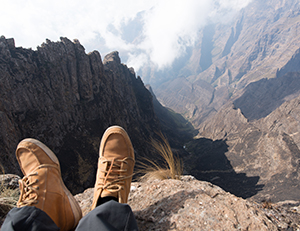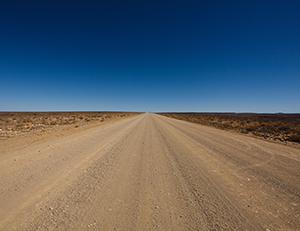The Otter Trail
If South African hikers had bucket lists for trails they simply must complete, you can be guaranteed that the Otter Trail would be right up there on them all. The trail leads you from the Tsitsikamma National Park’s Storms River mouth to the picturesque Nature's Valley. Named after the Cape clawless otter, this majestic hike boasts a yearlong waiting list, so you’ll have to plan accordingly.
The 42-kilometre hike is completed over five days and four nights. You’ll follow the rocky shoreline with a number of elevations, to a height of more than 150m. The hike isn’t a walk in the park, with some steep sections and rough terrain, and up to six hours of hiking a day. A moderate level of fitness is recommended for the trail.
Day 1: 4.8 km (2 hours)
Day 2: 7.9 km (4 hours)
Day 3: 7.7 km (4 hours)
Day 4: 13.8 km (6 hours)
Day 5: 6.8 km (3 hours)
The Otter Trail is open 364 days of the year (closed Christmas Day), and deciding when would be best to attempt the trail, depends on what type of experience you’re after. Summertime is the most popular time of year on the trail, especially as the river crossings serve as a nice cool-down on a hot day, rather than an icy dip during the colder months.
Accommodation comes in the form of intimate cabins nestled in the bushes, and not far from the shore – there’s no escaping the beauty of nature on this hike. The Otter Trail is the perfect choice for hikers wanting to experience the flora and fauna, and the breathtaking oceanic and forest views this unique trail has to offer!
Cost: R925- R1000 per person (including overnight huts)
The Grand Traverse

The Grand Traverse on the Drakensberg escarpment is arguably one of the most challenging hikes in South African. With drops of 3000+ metres, this is the wilderness at its best. The 210-250-kilometre off-trail hike, with non-stop climbing from one ridge to the next, boasts unbeatable views. The stars have never been more visible, the silence never more welcome on this majestic hike, which can take an experienced hiker anything from six to 12 days to complete. The Grand Traverse is very steep and rocky, and requires a high level of fitness and experience for the navigation of these ravines.
You have to carry all of your supplies yourself (so pack wisely), which proves extra challenging, as there is a strict “no-trace” policy – meaning you need to leave no trace of your having been there.
The weather is the primary concern on this strenuous hike. Hiking 3000+ metres above sea level in heavy cloud conditions, on steep ridges, can cause the GPS to fail, resulting in you getting lost, and being unable to contact the emergency helicopter. Make sure your route has been shared with the local rescue team for emergencies, and plan strictly according to the weather; March is safest from snowfalls and rainstorms.
Cost: From R125 for a single traverse and R12000 a person for a guided hike.
Kalahari Eco Walk

Unlike the mountainous and rocky Grand Traverse or coastal Otter Trail, the Kalahari Eco Walk involves nothing but the clothes on your back, shoes on your feet, and the limitless Kalahari Desert.
The walk, which was launched 12 years ago, is intended to offer walkers the opportunity to be one with the spirit of the Kalahari Desert, and to engage with locals.
Both the five-day and 10-day hikes are strenuous, and require average to good fitness to endure the 101-kilometre or 301-kilometre distances in the beautiful Kalahari Desert.
The organisers will meet you in Cape Town or in Upington, where accommodation and food is provided by the farmers and surrounding villages. Beginning at Daberas, next to the Augrabies National Park’ powerful falls, the walk leads you to the Riemvasmaak Wilderness Area (with hot springs to soothe those aching muscles). Here the locals share roosterbrood and bredies with you, while being entertained.
Your next stop is The Green Kalahari along the Orange River, where you’ll visit a grape and herb farm, and a winery called Bezalel. There you’ll enjoy homemade pot brandies and mampoer. The red dunes of the Kalahari are next, where you will experience the 15km-wide saltpan. After overnighting on the red dunes, the walk ends in Upington, where you’ll receive a rose quartz trophy upon completion.
Cost: The five-day walk is R6 500 per person; and the 10-day walk is R9 700 per person. Including transport (excluding flights), meals and accommodation.
Contact: Eco Ventures
Mobile: +27 (0)82 883 0093
Tel: +27 (0)21 972 1033
Email: explore@ecoventures.co.za
Essentials:
-
SANP permit wild card (if needed)
-
Sleeping bag
-
Backpack (maximum of a 1/4 of your body weight)
-
Rain protection cover for backpack
-
Dry sack watertight bag
-
Light (quick drying) towel
-
Hat
-
Costume (or quick drying shorts)
-
Quick dry long trousers
-
Two quick dry tops
-
Long sleeved top
-
Fleece
-
Tracksuit bottoms
-
Rain & windbreaker
-
Two pairs of thick outer socks
-
Two pairs light inner socks
-
Hiking Boots & Spare Laces
-
Light (fast drying) sandals (for river crossings)
-
Wet wipes
-
Toilet paper
-
Medical aid kit
-
Sun block
-
Mosquito repellent
-
Soap (biodegradable)
-
Toothbrush & paste
-
Sunglasses
-
Mobile phone (fully charged battery & a hard, watertight cover)
-
Knife
-
Head torch (extra batteries and headband)
-
Money (roughly R200 in a waterproof bag)
-
Camera
-
2lt Water bottles
-
Hiking gas cooker
-
Two boxes of matches
-
Two candles
-
A few plastic bags
-
Plate, mug, spoon, knife & fork
-
Tin opener
-
Plastic container
-
Bin bags
-
Pen & paper
-
Elastic bands
-
Duct tape
TIPS:
-
Take a loved one or close friends to share this experience with. A group of people you will get along with makes the journey so much more special.
-
Meet with your group before you leave to and plan meals, decide what to bring, and share the load between the hikers to avoid carrying unnecessary items (e.g. toothpaste, sunblock, pots, etc.).